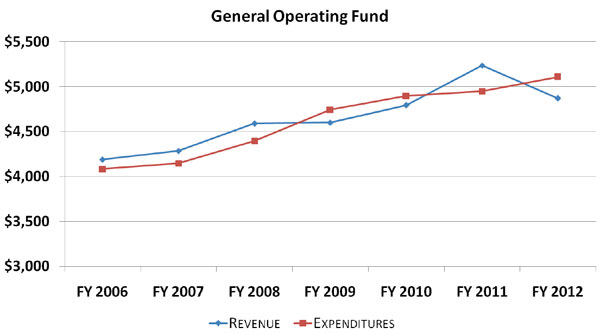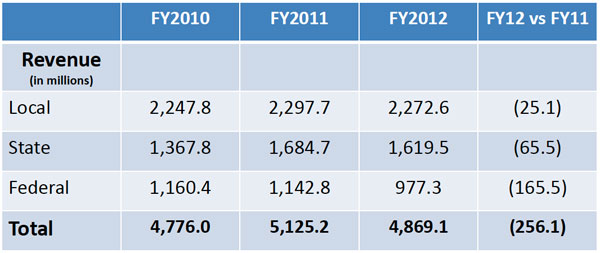The new CPS proposed budget was just released, and people are starting to page through it. Catalyst‘s twitter feed is a good place to go for live-figuring-things-out. The first big headline: CPS wants more property taxes to deal with this:

It’s a glass-half-full, glass-half-empty sort of question: does CPS have a revenue problem, or an expenditures problem? Well, both, but the revenue decline is obviously dramatic. And it’s instructive to note where it comes from:

I know I sound like a broken record, but: local agencies are inextricably linked to the state and federal governments. This is one thing that’s scared local advocates as the federal government cuts back on discretionary spending:
[O]ne out of every three dollars of state spending comes from the federal government — $478 billion alone in 2010, according to the Pew Center on the States. And if the federal payouts slowed under a default, the states would struggle mightily to pay their existing bondholders. National default could lead to state default.
Federal cutbacks squeeze local governments both directly and indirectly. What happens? As Suzy Khimm predicted prior to the debt-ceiling deal, exactly what CPS plans to ask for:
Even if state governments hold special sessions to cut spending further, their cuts will still “filter through to the local government,” he added. “Public-sector workers get laid off. There’s higher employment and lower spending.”
Local governments will try to raise property taxes to raise revenue, which could be yet another drag on a housing market that’s yet to recover.
But CPS isn’t just looking at increasing local revenues (they’re shooting for $150.3 million, at $84 per homeowner per year). The big chunk towards eliminating the $712 million budget deficit is expense reductions, which would include teachers giving up a four-percent COLA raise ($100 million), and another $220.7 million in reorganization, operations efficiency, and program reductions, which include:
* Cutting CPD expenses ($13 million)
* "Reduce funding for mentoring programs, while serving the same number of students." ($10.7 million cut out of $16.7 million)
If the property tax increase doesn’t go through, the fallbacks include:
* "Increase Class Size Across CPS to 31/class" ($41 million)
* "Reduction of 20% in Early Childhood Programs" ($40 million)
There’s much more where that came from; all the relevant documents are here. As previously mentioned, @CatalystChicago is live-tweeting what they learn and soliciting input; since they have knowledgeable readers it’s pretty interesting. CPS, for its part, is holding public meetings before it goes to a vote on August 24th:
* 8/10 at Lane Tech, 7 PM (2501 W. Addison Street)
* 8/11 at Westinghouse, 7 PM (3223 W Franklin Blvd)
* 8/12 at Simeon, 7 PM (8147 S Vincennes)
And CPS head Jean-Claude Brizard is getting a live call-in show, Schools On the Line on WBEZ, which debuts Monday at 7 PM.


